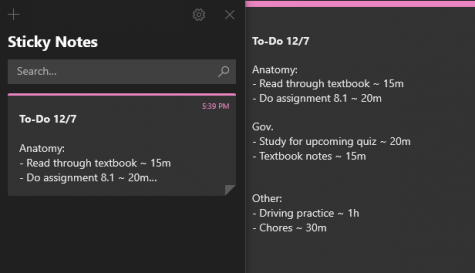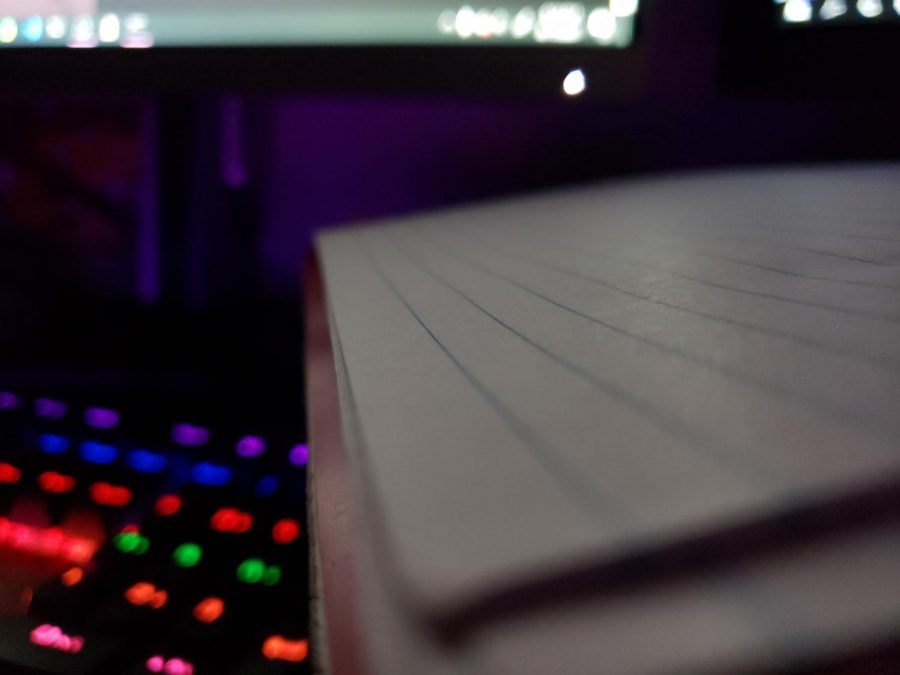How to Improve Your Homework Habits and Workspace
Improving your working and studying habits and staying on track!
April 11, 2021
With remote learning keeping us all at our desks and beds and stacking the work up to our ears, it’s more important now than ever to make your working habits the best they can be, and to make your workspace as efficient as possible.
So, here are a few (very easy) things you can do right now to help ease the load of your work and to keep your study spirits and work ethic up high!
Special thanks to Junior Erick White for contributing his thoughts and experience on dealing with a high workload.
What makes work hard
When our responsibilities seem to jump out from the shadows and grab us by the necks, it’s really easy to give up or push them off to the next day because it just seems like so much to do – we all do it, including me. For the most part, work gets hard because we don’t want to do it, and we procrastinate.
Sometimes, it comes from an overload or an overexertion. Maybe taking too many AP classes or joining too many clubs, sports, or extracurriculars.
Every once in a while, life gets in the way. It could be a doctor’s appointment, an emergency, an illness – or something of the like – that makes it so we can’t take care of life’s daily responsibilities.
Whatever the reason may be, every person reading this article has had more work than they ended up doing.
Dealing with Procrastination
Pushing off responsibilities is, unfortunately, a human tendency. It’s easy to come up with an excuse or just say “I’ll do it tomorrow” – I know because I do it all the time.
It gets especially easy to procrastinate when we see a better alternative. Why do all this boring homework when I could be hanging out with friends or playing some games or [insert hobby here]?
I talked to Erick White, a Doherty Junior who is no stranger to taking on loads of work. Not only does he take four AP classes. but he’s the Junior Representative for NHS, Co-President of the Aerospace Club, and he’s a member of Science Olympiad, Mathletes, LINK Crew, and the Colorado Springs Astronomical Society.
I asked him how he tackles so much work, and how he keeps procrastination at bay, and his answer was pretty simple: just do the work.
That sounds a little counter-intuitive, but there’s some logic behind it. Before letting yourself push things off, just do it. The sooner you can get it done, the sooner you can move on to something much more fun and entertaining. A heavy workload (or even a small one) is sort of like brussel sprouts; they seem scary and unappetizing at first, but when you actually just sit down and eat one, they’re not that bad.
When you actually get in the groove of doing homework, and you get out of the mindset of not wanting to do it, actually doing it isn’t so terrible, and it’s done a lot faster than it looks like it’ll get done.
Staying prepared
Another invaluable thing you can do to alleviate the struggles of responsibilities is to be prepared.
At the surface, the easiest thing you can do is to keep a planner. One super easy place to keep a brief list of your tasks is actually right on your school laptop: an app called Sticky Notes. They save automatically and it’s super duper easy to open up and write down your stuff, and to cross it out when you’re done with it.

It also helps me to write down an estimate of how much time I think it will take. You can also try organizing by the assignment or task’s priority, or you can write when the task needs to be done.
Staying prepared can help you ease off stress, but it can also help you be ready for when life throws a curveball, or if it’s anything like 2020/2021, it’s about 6 of them, and they’re not baseballs, they’re molten steel chunks hurtling your way at a hundred miles an hour.
Erick says the best thing you can do to stay on top of your work and keep the stack of papers less than 3 feet high is to do just that – do the work as it comes your way. This sort of ties back to procrastination; if you do things as they come, then you have so much less to worry about later, and you’re way more ready when your time is stretched for a day or two.
What works for you
Another often-missed thing that really affects how well you handle your responsibilities is the element of you. Everybody’s mind works differently, and some people study and learn and take care of their tasks in different ways than other people might.
Experiment with what works for you. I know a good number of people that can’t stand planners; for them, it just takes more time to write out their assignments than it does to do them, and they don’t even check it in the first place. For me, it’s a good thing to double-check to make sure I have everything done, and it’s a way to organize my mind and make sure I stay on track.
A good number of people have a hard time focusing. I am also one of these people. Especially when it’s hours upon hours of mind-numbing work, you sometimes feel like you’re just draining out everything in you just to finish one math question out of a hundred. No matter what you do to learn and focus, one surefire thing that everyone should keep in mind is that it’s okay to take breaks.
When you’re losing focus and concentration, sometimes it’ll take you longer to try and focus for a few seconds than it will to take 10 or 15 minutes away from the stuff you need to do and give your mind a rest. Maybe get a few minutes of your favorite show in (as long as you have the self-control to not start binging) or eat a snack or exercise or jog.
Knowing and recognizing when you’re running out of energy and your focus is dwindling is a really useful skill, and can make it so much easier to finish the last stretch of your workload when you’re a bit more refreshed and have some stimulus in your brain.
Workspace
Lastly, it’s super super extra important to make sure that you’re in a place and environment that you’re comfortable working in and one where you can focus.
For some people, the dinner table or a bed does just fine. Others that have a hard time staying on track often find it better to have a dedicated area for studying to help them get in the mindset of work.
It really helps to have a desk, somewhere with a chair to keep you in good posture and a hard space to keep papers and a laptop on. Keeping an organized and healthy desk will give you a healthy and organized mind.
So, there you have it – some of the best ways to stay on top of homework and studying, and to make school more fun, or at least bearable.
Let us know some of your study habits. What works the best for you? What didn’t we cover? And did these things help you?





